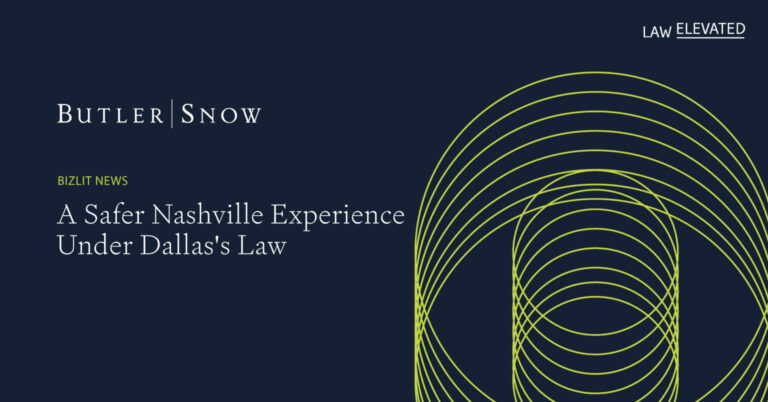The multi-floored music meccas known as honky-tonks have made Nashville a key travel destination. Considering that these bars quickly fill with drunken partygoers, many honky-tonks staff security to keep the revelry at a respectable level. However, untrained security guards can create a danger to patrons, too. For example, 22-year-old Dallas Barrett was killed at Whiskey Row, a downtown Nashville bar, after an altercation with six security guards, some unlicensed and some untrained.
New Tennessee legislation, known as Dallas’s Law, seeks to prevent similar tragedies while also offering a safer experience for all. Dallas’s Law reinforces some training and licensing requirements in Tennessee’s Private Protective Services Licensing and Regulatory Act (the “Act”). The Act and Dallas’s Law deal with private security outside the bar bouncer context, however, this blog focuses on the changes that will apply to establishments maintaining a license or permit for on-premises alcohol consumption from the alcoholic beverage commission or a beer board.
New Training Requirements: § 62-35-118, 122
Within fifteen days of employment, all security guards must complete training in de-escalation, safe restraint, first aid, and CPR. Additionally, all security guards must complete refresher training on these requirements every two years in addition to renewing their registration cards.
New Documentation Requirements: § 62-35-123
Bars and restaurants that maintain a proprietary security organization[1] must follow additional requirements when sending their initial notice to the Commissioner[2], including (1) documentation of insurance coverage compliant with § 62-35-114 (2) a set of classifiable electronic fingerprints of the qualifying manager[3] and (3) a $100 registration fee. For the organization to maintain its status as an approved proprietary security organization, it must submit a biennial fee of $100. Notably, the proprietary security organization must notify the Commissioner within fifteen days of a change in the qualifying manager. Failure to do so can result in a civil penalty not exceeding $1,000 for each day over fifteen days in which the organization has failed to notify the Commissioner.
When the Commissioner receives the organization’s notice, the Commissioner will then (1) investigate to determine whether the notice is factually accurate (2) compare or have the Tennessee Bureau of Investigation compare the fingerprints to previously submitted prints, and (3) submit the fingerprints to the FBI to determine whether the manager has previously recorded convictions.
New Punishments for Hiring Improperly Registered Security: § 62-35-134
It is generally unlawful for an establishment to knowingly hire someone as a security guard when that person does not hold a valid or appropriate registration card. If violating this provision, the alcoholic beverage commission or beer board must suspend the establishment’s alcohol license or permit, with one month of suspension for each violation. The commission or board can also seek further punishment, such as revoking the establishment’s license or permit.
Conclusion
Governor Bill Lee signed Dallas’s Law on June 1st, 2022, with the new provisions taking effect on January 1st, 2023. Honky-tonks, watering holes, and restaurants alike should use the remaining months of 2022 to ensure that they comply with these new requirements.
[1] Section 62-35-102 defines proprietary security organization as a person or department of an organization (here, bars and restaurants) that employs a security guard/officer.
[2] The “Commissioner” refers to the Tennessee Commissioner of Commerce and Insurance or the Commissioner’s designee.
[3] Section 62-35-102 defines a qualifying manger as the individual designated to be responsible with compliance with the Private Protective Services Licensing and Regulatory Act.
